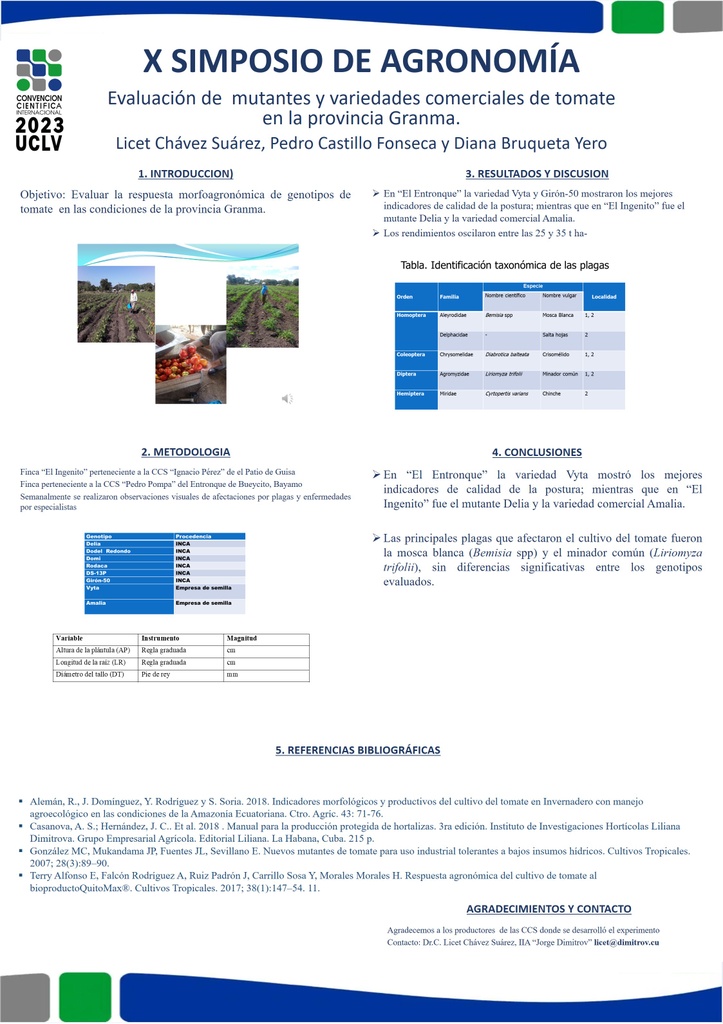Executive Secretary

9th International Scientific Conference on Agricultural Development and Sustainability
10th Symposium of Agronomy

Abstract
Tomato production in Cuba does not satisfy the demand of the population due to the low yields obtained due to the incidence of biotic and abiotic factors. At the National Institute of Agricultural Sciences, several tomato genotypes tolerant to adverse conditions have been obtained. The objective of this work was to evaluate the morphoagronomic response of tomato mutants and commercial varieties under the conditions of the Granma province. The experiment was developed in two locations in the Granma province: the “El Ingenito” farm belonging to the CCS “Ignacio Pérez” of Patio de Guisa and a farm belonging to the CCS “Pedro Pompa” of Entronque de Bueycito. Eight tomato genotypes, six mutants and two commercial varieties Vyta and Amalia were evaluated under low input conditions. In the experiment developed in “El Entronque” the genotypes, Vyta and Girón-50, showed the best values of indicators of posture quality; while in “El Ingenito” it was Delia and the commercial variety Amalia. Yields ranged between 25 and 35 t ha. In both locations, Geminivirus, transmitted by whiteflies (Bemisia spp), and Tospovirus were identified as diseases that affected the crop. As a result of the tasting test, it was found that the most accepted genotype was Vyta, followed by Girón-50, based on its less acidic flavor, soft texture and larger size. It is concluded that the tomato mutants had a similar behavior to the commercial varieties.
Resumen
La producción de tomate en Cuba no satisface la demanda de la población por los bajos rendimientos que se obtienen debido a la incidencia de factores bióticos y abióticos. En el Instituto Nacional de Ciencias Agrícolas, se han obtenido varios genotipos de tomate tolerantes a condiciones adversas. El objetivo de este trabajo fue evaluar la respuesta morfoagronómica de mutantes de tomate y variedades comerciales en las condiciones de la provincia Granma. El experimento se desarrolló en dos localidades de la provincia Granma: la finca “El Ingenito” perteneciente a la CCS “Ignacio Pérez” del Patio de Guisa y una finca perteneciente a la CCS “Pedro Pompa” del Entronque de Bueycito. Se evaluaron ocho genotipos de tomate, seis mutantes y dos variedades comerciales Vyta y Amalia en condiciones de bajos insumos. En el experimento desarrollado en “El Entronque” los genotipos, Vyta y Girón-50, mostraron los mejores valores de indicadores de la calidad de la postura; mientras que en “El Ingenito” fueron Delia y la variedad comercial Amalia. Los rendimientos oscilaron entre las 25 y 35 t ha-. En ambas localidades se identificaron como enfermedades que incidieron en el cultivo el Geminivirus, trasmitido por la mosca blanca (Bemisia spp) y el Tospovirus. Como resultado de la prueba de degustación se obtuvo que el genotipo de mayor aceptación fue Vyta, seguido de Girón-50, basados en su sabor menos ácido, la textura suave y el mayor tamaño. Se concluye que los mutantes de tomate tuvieron un comportamiento similar a las variedades comerciales.
About The Speaker

Dr. Licet Chávez Suárez

Discussion

